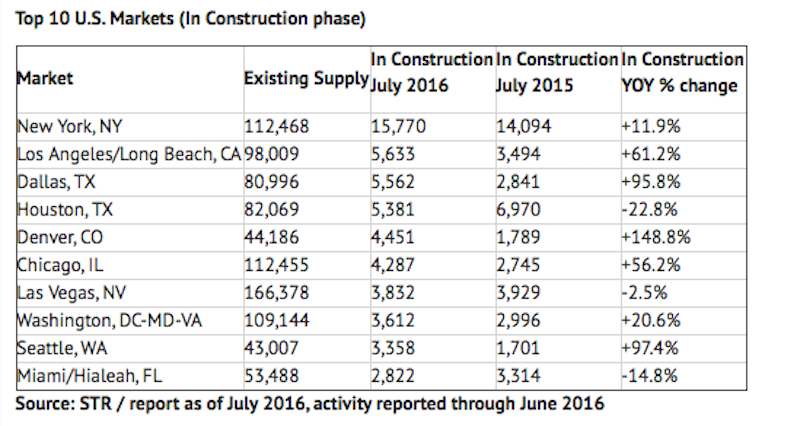The hotel sector is booming. But for how long?
Last April, the Real Deal, which tracks real estate news and trends, reported that new hotel construction in New York, which peaked in 2014, “is finally crashing” because so many new properties were coming online and developers were shying away from planning new projects.
In the first three months of this year, hoteliers had submitted permit applications for only six new hospitality properties, a total of 512 units, citywide. The Real Deal estimates that barely 10,000 new hotel rooms would be added to New York’s inventory this year, compared to more than 9,000 in 2014.
On Tuesday, Lodging Econometrics, the Portsmouth, N.H.-based market research firm, reported that New York City has the country’s largest hotel construction pipeline by project count: 196 projects and 32,121. New York has had the largest project count since the fourth quarter of 2011.
New York is followed by Houston (170 projects, 20,083 rooms), which has been the second-largest hotel market for the past 10 quarters, according to Lodging Econometrics. The rest of the top five hotel construction metros are Dallas (128 projects/15,662 rooms), Nashville (109/13,789), and Los Angeles (104/17,912).
A day before Lodging Econometrics released this data, STR, a global data benchmarking and analytics firm, released its July 2016 Pipeline Report, which showed 171,276 rooms in 1,305 projects under construction, a 32.6% increase over the same month a year ago.
STR estimates that New York, with an existing supply of 112,468 rooms, had 15,770 rooms under construction, 11.9% more than in July 2015. Three other markets—L.A./Long Beach, Dallas, and Houston—had more than 5,000 rooms under construction.
Conversely, Bobby Bowers, STR’s Senior Vice President of Operations, notes that the San Francisco/San Mateo, Calif., market may be reaching a saturation point, with room construction among the five-lowest in the country.

New York City continues to lead the nation in new hotel construction and rooms under contract. The nation's 26 largest cities are, for the most part, seeing strong growth in their hospitality sectors, even as some developers worry that too much inventory may be coming online. Chart: STR
Related Stories
| Nov 15, 2013
Greenbuild 2013 Report - BD+C Exclusive
The BD+C editorial team brings you this special report on the latest green building trends across nine key market sectors.
| Nov 15, 2013
Pedia-Pod: A state-of-the-art pediatric building module
This demonstration pediatric treatment building module is “kid-friendly,” offering a unique and cheerful environment where a child can feel most comfortable.
| Nov 13, 2013
Installed capacity of geothermal heat pumps to grow by 150% by 2020, says study
The worldwide installed capacity of GHP systems will reach 127.4 gigawatts-thermal over the next seven years, growth of nearly 150%, according to a recent report from Navigant Research.
| Nov 8, 2013
Oversized healthcare: How did we get here and how do we right-size?
Healthcare facilities, especially our nation's hospitals, have steadily become larger over the past couple of decades. The growth has occurred despite stabilization, and in some markets, a decline in inpatient utilization.
| Nov 6, 2013
Green hotel trends: Industry expands its sustainability focus beyond laundry
There’s more to creating a sustainable hotel than saving water and power by asking guests to reuse their towels.
| Oct 30, 2013
15 stellar historic preservation, adaptive reuse, and renovation projects
The winners of the 2013 Reconstruction Awards showcase the best work of distinguished Building Teams, encompassing historic preservation, adaptive reuse, and renovations and additions.
| Oct 30, 2013
11 hot BIM/VDC topics for 2013
If you like to geek out on building information modeling and virtual design and construction, you should enjoy this overview of the top BIM/VDC topics.
| Oct 28, 2013
Urban growth doesn’t have to destroy nature—it can work with it
Our collective desire to live in cities has never been stronger. According to the World Health Organization, 60% of the world’s population will live in a city by 2030. As urban populations swell, what people demand from their cities is evolving.
| Oct 18, 2013
Researchers discover tension-fusing properties of metal
When a group of MIT researchers recently discovered that stress can cause metal alloy to fuse rather than break apart, they assumed it must be a mistake. It wasn't. The surprising finding could lead to self-healing materials that repair early damage before it has a chance to spread.
| Sep 24, 2013
8 grand green roofs (and walls)
A dramatic interior green wall at Drexel University and a massive, 4.4-acre vegetated roof at the Kauffman Performing Arts Center in Kansas City are among the projects honored in the 2013 Green Roof and Wall Awards of Excellence.

















